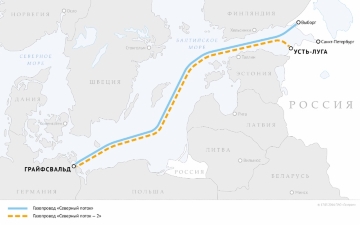A specific framework just for Nord Stream 2 would discriminate against an individual commercial investment, based on political sentiment. It is unacceptable that among other comparable pipeline projects the European Commission, as the guardian of the EU Treaties, has singled out Nord Stream 2 for a special political treatment. This infringes against the principle of equal treatment, which is a constituting element of the EU Founding Treaties.
The implications of the Commission’s approach go far beyond Nord Stream 2. It provokes legal uncertainty where there is none and undermines a market based approach that the Commission claims to be advocating. This sort of political cherry-picking sets a dangerous precedent for any commercial infrastructure investment in the EU.
Nord Stream 2 permit procedures are conducted by the competent national authorities in compliance with applicable legislation. The procedures are based on clear legal criteria and they are progressing normally. The applicable laws make no reference to an agreement between the EU and the Russian Federation as a requirement for the permits.
The European Commission “has today adopted a request to the Council of the European Union for a mandate to negotiate with the Russian Federation the key principles for the operation of the Nord Stream 2 gas pipeline project”.
“Nord Stream 2 believes that this initiative is entirely unnecessary. The German regulator already confirmed that there is no legal void that needs to be addressed. Our permitting procedures have been launched successfully and are being conducted by the competent authorities in full compliance with all applicable laws. As part of these procedures, Nord Stream 2 is now actively engaging in open and transparent consultations with stakeholders in all countries around the Baltic Sea” - Sebastian Sass, EU Representative Nord Stream 2 AG.
The reasoning of the Commission is flawed and based on misperceptions.
The Commission seeks a “special legal framework” that would be applied only to Nord Stream 2 and not to any of the six comparable import pipelines that exist or are planned for transporting gas to the EU from outside the internal market.
The Commission recognises correctly that the internal energy market laws (Third Energy Package) cannot be applied to any of the pipelines outside the internal market, like Nord Stream 2. However, the Commission fails to acknowledge the existing legal framework that applies to such pipelines. Furthermore, the Commission’s initiative is based on a misperception of the impacts of Nord Stream 2 on the EU’s internal market.
A comprehensive legal framework is in place.
The Nord Stream 2 project is subject to a comprehensive legal framework based on EU law, international conventions, and national legislation of the countries along the route of the pipeline.
In Europe, there are six comparable import pipelines that are subject to the same legal regime. The principle of equal treatment is a constituent element of EU law. A “special legal framework” for only one pipeline would infringe upon this fundamental principle. The German regulator Bundesnetzagentur has duly informed the Commission of the risk of a “discriminatory practice” associated with unequal application of legal requirements.
Effective rules are in place to let the market decide whether to buy Nord Stream 2 gas.
The Commission ignores the contribution of Nord Stream 2 to the internal market of the EU. Thanks to the efforts of the EU, considerable progress has been made over recent years in creating an internal energy market. Reports by respected and neutral institutions such as the Agency for the Cooperation of Energy Regulations (ACER) have shown that gas does flow to where it is needed, irrespective of the route through which it enters the internal market . The EU’s gas supply was never more diverse than today. Consumers in the EU have more options than ever to source gas. More and more gas, including from Russia, is priced on a spot market basis, and nothing prevents Central and Eastern European markets from booking capacity to access hubs. Capacity is sold via an open auction process. Customers in EU countries can now buy gas from whoever they want and ship it to wherever they want. Nord Stream 2 will offer an additional supply option for European consumers. In view of the variety of supply options it cannot lead to a dominant position on the EU gas market for any supplier.
Market dynamics clearly demonstrate the need for Nord Stream.


